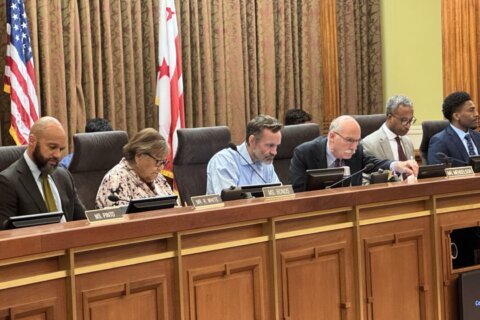Police officers are anxious ahead of the presidential inauguration following the attack on the U.S. Capitol where officers became the targets of mob violence. It is just the latest concern in a tumultuous year in policing.
WTOP Investigative Reporter Megan Cloherty spoke with police officers in departments across the D.C. area for her series “Policing through Change.” Promised anonymity, they were candid about the new challenges in a high-risk job brought on by the pandemic, social unrest resulting in a shift in public sentiment and the resulting legislative police reforms. This series is meant to share local officers’ opinions on those topics.
Law enforcement in and around Washington, D.C., are still reeling more than a week after a mob forced their way into the U.S. Capitol and attacked police officers.
“I think it’s a hard thing to just move on from,” said an officer with more than 15 years of service with the D.C. police.
He did not respond to the Capitol but, like thousands of other officers, said it was hard to watch his colleagues become targets.
“You just kind of have this guilty feeling,” he said of not being there alongside them.
Acting D.C. Police Chief Robert Contee remarked on the extreme circumstance that left 56 officers injured.
“We were in a fight not just for our lives, but for the democracy of this country,” Contee said at a news conference earlier this month.
Now, federal and local law enforcement are preparing to ensure a safe presidential inauguration Jan. 20 despite the threats.
Contee on Jan. 15 said it was “all hands on deck for our entire agency, because our entire agency has responsibility for the entire city. With that being said, the influx of federal resources that you see into our city certainly allows for MPD to be agile to be very nimble in our response posture to any threats that could that may occur.”
The D.C. officer who spoke with WTOP under a promise of anonymity said his colleagues are apprehensive heading into the inauguration, but will do everything they can to protect the city and its residents.
“We don’t know what’s gonna happen. And it could very well likely turn out like what happened at the Capitol. I hope it doesn’t turn out like that. But that’s, you know, a lot of people are calling for it. It’s a very, very crazy time in our lives.”
‘We’re afraid of the citizens’
As they prepare a security plan for a peaceful transfer of power, law enforcement are still assuming the higher risk of contracting COVID-19 virus that all first responders face.
Officers were candid in their explanations of how the pandemic has changed their job on a day-to-day basis. As some are concerned about the risk of contracting the coronavirus, they are all expected to change how they work, to abandon proactive policing, and adopt a hands-off approach with public health in mind.
The National Institutes of Justice defines proactive policing as strategies and tools for stopping crime before it occurs. “Proactive policing is getting out in front of events in the hopes of preventing crimes and working with the community to reduce crimes,” the NIJ director wrote in 2018.
“Everyone is afraid,” said an officer within the Prince George’s County Police Department about the coronavirus threat. “The citizens are afraid of us and we’re afraid of the citizens.”
The officer said the fear amounts to making fewer traffic stops, and choosing not to act on suspicious behavior he may have checked out in person prior to the coronavirus.
“Honestly what we do all day? Hide. Hide from people; find hiding spots and hide,” he said.
“What they’re doing instead is sitting there, being a little more visible in the neighborhood,” said Angelo Consoli, president of the Fraternal Order of Police Lodge 89, which represents Prince George’s County officers. “It’s kind of a different style of policing. Instead of being in your face doing it, it’s more, so, ‘Hey, we’re here,’ and making people move along on their own.”
The Prince George’s County Police Department replied in a statement that they’ve made changes in response to the pandemic, such as taking more calls over the phone to limit interaction with the public and increasing the number of officers in their Telephone Reporting Unit.
“Since we were limiting person-to-person interaction as much as possible, patrol officers were strategically assigned to high visibility patrol throughout the county,” the department said. “… Policing during a pandemic may look different, but by no means are we hiding from anyone; we are engaging with our community as much as we can while following CDC protocols.”
But a detective who has worked for the D.C. Police Department for more than 10 years said it’s not just the pandemic that is making policing more difficult. He also finds it nearly impossible to separate the effects of two coinciding events: the positive feedback from the community at the outset of the pandemic, and the social unrest following George Floyd’s killing at the hands of the Minneapolis police.
“With the onset of the pandemic, being an essential worker, you kind of got the sense that people appreciated you more, and people were like, ‘Oh, let’s praise our first responders.’ And then [it was] just a complete 180, where the police are no [longer] Officer Friendly; they’re not there to protect you. The police, especially, are being demonized.” the detective said, citing recent movements to defund or abolish the police.
While the pandemic is partially behind the shift from proactive policing, the detective maintains that the shift has been happening for years.
“I think a lot of people get the idea [that] if you’re being proactive, you’re possibly violating people’s civil rights or being excessive. I think you can look at the data [from] 10 years ago … when there was more proactive policing. We always had an opportunity — if an officer was out of line, there were consequences for that … But if you compare the difference between then and now, being proactive actually helped reduce a lot of violent crime,” he said.
It’s true that D.C. ended 2020 with a homicide rate 19% over the year before. Other violent crime, however, including sex abuse, assault with a dangerous weapon and robbery, was down 4%.








